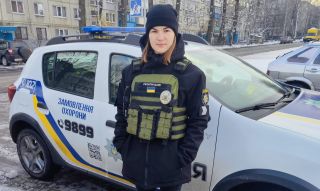Altruism
Altruism and War in Ukraine
A young Ukrainian policewoman's courage amidst war's horrors.
Posted December 8, 2023 Reviewed by Hara Estroff Marano
Key points
- Altruism prompts a Ukrainian paramedic to override her sense of self-preservation—and run towards danger.
- Applying a tourniquet to the tiny leg of an innocent four-year-old becomes a painful moral injury.
- Despite injury and ongoing rehabilitation, the paramedic returns to her job at the first possible moment.
When Anastasia Kulikova joined the Security Police Department in the Donetsk region of Ukraine in 2020, she was fulfilling her life’s motivation to serve and protect. She chose to become a paramedic, but, nothing could have prepared her for the scenes of horror she has been forced to endure since the 2022 Russian invasion. Her experience offers insights into the psychology of selflessness in the face of extreme adversity.

Rocket Attacks
Kulikova lives in one of the most dangerous regions in eastern Ukraine. On August 7, 2023. the Russian invaders began rocket attacks on civilian buildings in her town of Pokrovsky, where she and part of her police department were transferred after the occupation of Mariupol.
The Russians deployed a particularly chilling tactic during the attack, but it’s one they make a practice of using: They bomb a building and then, after allowing time for first responders and rescuers to come to the bomb site, they target the same site a second time.
“They do this,” Kulikova said in a recent interview, “so they can also kill the people who have come to help, and in that way, kill as many Ukrainians as possible.”
A Scene of Horror and Chaos
In her own case, after a building next to a children’s playground was bombed, she rushed to the site, knowing that paramedics would be urgently needed. When she arrived at the scene, she found roughly 40 badly injured individuals.
As she remembers, “Everyone was yelling, asking for help, and crying. The most awful thing is, you can’t know who to help first because there are so many people and so much blood.”
What nothing had prepared her for was helping the small children from a nearby kindergarten. “It’s not just the physical part of treating them, although that part was terrible. You aren’t sure how to stop the bleeding in a four-year-old’s leg. The leg is so unthinkably tiny, compared to putting a tourniquet on an adult.”
The other horrible part was the moral part. Knowing that people had injured a completely innocent child was so appallingly wrong. It was soul-shaking for her. It was a moral injury.
A Bombing Victim Herself
Kulikova began her work of applying tourniquets and saving lives but, shortly into this work, the Russians bombed the site again. “And here everything is like in a fog,” she remembers. “It was so loud I became temporarily deaf, and I still have hearing issues. The first moment after a bomb strikes, it causes compression waves so strong they kill cells in your brain, and you will have this problem to the end of your life.”
In addition to the hearing loss, she also suffered shrapnel wounds in her arms and chest. “The pain felt as if I were in a fire, being burned alive,” she recalls.
As a trained paramedic, she instantly became aware that she had to stop her own severe bleeding. However, with two injured hands, applying a tourniquet was close to impossible. “I remember getting out my tourniquet. I’m seeing that my right hand is covered in blood of a dark color. I understand that it is venous. It was difficult to move my left hand, but I knew I had to put the tourniquet on by myself, without help.”
She eventually succeeded. But in the process, Kulikova lost two liters of blood.
Some of the surviving first responders took her to the nearby hospital, and, from there, an ambulance took her for further medical treatment in Kyiv.
After a month of treatment and numerous operations, Kulikova is currently undergoing rehabilitation in the Kyiv region. Doctors still haven’t removed all the shards from her left hand, and she has difficulty moving her right hand. “My fingers do not obey me,” she says. “My doctors say that all this can be fixed, but the rehabilitation will take about two years."
Back at Work
She still has trouble sleeping, and even speaking about what happened to her is stressful. However, she wants to speak up because she wants people to know.
Between nerve medications, sleep medications, and pain medications, she is spending 33% of her police salary of $800 a month on pills.
Kulikova has recently returned to her police job, and she did it eagerly. When asked why, she answered, her voice firm and decisive: “If I can help, I will help. I will do this as long as I live.”


